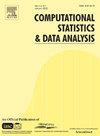逆问题的变分推理框架
IF 1.5
3区 数学
Q3 COMPUTER SCIENCE, INTERDISCIPLINARY APPLICATIONS
引用次数: 0
摘要
本文提出了一个通过变分贝叶斯近似拟合逆问题模型的框架。这种方法保证了统计模型规范在广泛应用中的灵活性、良好的准确性和更短的模型拟合时间。此外,还介绍了变异贝叶斯的消息传递和因子图片段方法,这有助于简化近似推理算法的实施,并允许在逆问题模型中加入多种响应分布和惩罚。本文研究了一维和二维响应变量的模型,并建立了一个基础架构,在此基础上,基于变量间弱交互作用的高效算法更新也可以推导出更高维度的逆问题。一个图像处理应用和一个以生物医学问题为动机的模拟练习揭示了有效实施变异贝叶斯而非马尔可夫链蒙特卡罗所带来的计算优势。本文章由计算机程序翻译,如有差异,请以英文原文为准。
A variational inference framework for inverse problems
A framework is presented for fitting inverse problem models via variational Bayes approximations. This methodology guarantees flexibility to statistical model specification for a broad range of applications, good accuracy and reduced model fitting times. The message passing and factor graph fragment approach to variational Bayes that is also described facilitates streamlined implementation of approximate inference algorithms and allows for supple inclusion of numerous response distributions and penalizations into the inverse problem model. Models for one- and two-dimensional response variables are examined and an infrastructure is laid down where efficient algorithm updates based on nullifying weak interactions between variables can also be derived for inverse problems in higher dimensions. An image processing application and a simulation exercise motivated by biomedical problems reveal the computational advantage offered by efficient implementation of variational Bayes over Markov chain Monte Carlo.
求助全文
通过发布文献求助,成功后即可免费获取论文全文。
去求助
来源期刊

Computational Statistics & Data Analysis
数学-计算机:跨学科应用
CiteScore
3.70
自引率
5.60%
发文量
167
审稿时长
60 days
期刊介绍:
Computational Statistics and Data Analysis (CSDA), an Official Publication of the network Computational and Methodological Statistics (CMStatistics) and of the International Association for Statistical Computing (IASC), is an international journal dedicated to the dissemination of methodological research and applications in the areas of computational statistics and data analysis. The journal consists of four refereed sections which are divided into the following subject areas:
I) Computational Statistics - Manuscripts dealing with: 1) the explicit impact of computers on statistical methodology (e.g., Bayesian computing, bioinformatics,computer graphics, computer intensive inferential methods, data exploration, data mining, expert systems, heuristics, knowledge based systems, machine learning, neural networks, numerical and optimization methods, parallel computing, statistical databases, statistical systems), and 2) the development, evaluation and validation of statistical software and algorithms. Software and algorithms can be submitted with manuscripts and will be stored together with the online article.
II) Statistical Methodology for Data Analysis - Manuscripts dealing with novel and original data analytical strategies and methodologies applied in biostatistics (design and analytic methods for clinical trials, epidemiological studies, statistical genetics, or genetic/environmental interactions), chemometrics, classification, data exploration, density estimation, design of experiments, environmetrics, education, image analysis, marketing, model free data exploration, pattern recognition, psychometrics, statistical physics, image processing, robust procedures.
[...]
III) Special Applications - [...]
IV) Annals of Statistical Data Science [...]
 求助内容:
求助内容: 应助结果提醒方式:
应助结果提醒方式:


